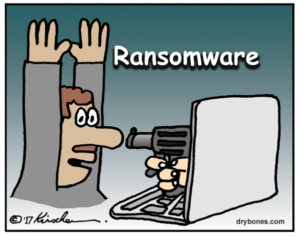Teen Caught Red-Handed in MGM Meltdown
The UK has taken a page out of every heist movie ever made by arresting a 17-year-old from Walsall, England, suspected of masterminding the MGM Resorts ransomware debacle in Las Vegas. This teenage troublemaker, whose name is still under wraps (probably because he’s still grounded), faces serious charges of blackmail and breaking the UK’s Computer Misuse Act.
In a plot twist straight out of a cyber-thriller, the UK’s National Crime Agency and the FBI teamed up to raid his home, seizing digital gadgets that are now under forensic scrutiny. This teen is linked to a global cybercrime ring, though the details are as secretive as the recipe for Coca-Cola.
The ALPHV/BlackCat ransomware gang took credit for the MGM caper, which, believe it or not, started with a 10-minute phone call to a Help Desk employee, armed with nothing more than LinkedIn intel. This digital drama resulted in a nine-day shutdown of MGM Resorts’ systems—talk about an extended vacation!
The slow-motion action of the investigation makes one wonder if law enforcement was on a coffee break. Analysts pinpointed the Scattered Spider group within days, but it took a year to arrest the culprit. Prosecution might take even longer, which does raise questions about whether our legal system is keeping pace with these tech-savvy miscreants.
LA Courts Take a Cyber Sabbatical
Los Angeles Superior Court, the largest unified trial court in the U.S., was forced to hit the pause button on Monday thanks to a ransomware attack from the previous week. The cyber calamity struck on Friday, forcing all 36 courthouse locations in LA County to close their doors while tech experts scrambled to get everything back up and running. The court’s website was also out of service, leaving things like jury duty and case management in limbo. The culprits are still unknown, but they clearly enjoy making lawyers’ lives a little more complicated.
The ransomware turned every electronic system—think internet-connected devices and phone lines—into an expensive paperweight. This is part of a growing trend where ransomware attacks are disrupting everything from hospitals to schools, which are now closing down more frequently than they used to for bad weather.
The real kicker? These attacks aren’t just causing chaos; they’re also becoming geopolitical chess moves, with Russia’s involvement in the mix. The U.S. government might need to classify these cyber intrusions as national security threats, especially when they target critical infrastructure.
SolarWinds’ SEC Drama: Case Closed
A U.S. judge has largely dismissed the SEC’s lawsuit against SolarWinds and its CISO, Timothy Brown, over allegations that they misled investors about the company’s security vulnerabilities before and after the infamous Sunburst cyberattack. Judge Paul Engelmayer labeled the SEC’s claims about post-attack statements as “hindsight and speculation” and chucked out most pre-attack allegations as well. Apparently, the SEC’s attempt to hold SolarWinds accountable for a cyberattack that involved Russian hackers was more miss than hit.
While SolarWinds and Brown are celebrating the court’s ruling with what we assume is a well-deserved high-five, the SEC remains tight-lipped. This lawsuit, which was unusual for targeting a victim company and its executive, underscores a troubling trend where attack victims might be blamed instead of the perpetrators.
Healthcare Hits the Ransom Road
The National Community Pharmacists Association (NCPA) and over three dozen healthcare providers from 22 states have filed a federal lawsuit against Change Healthcare, Optum, and UnitedHealth Group following a February 2024 ransomware attack. This cyber mishap compromised patient data, disrupted services, and exposed some glaring cybersecurity gaps.
The plaintiffs are seeking damages for the financial and reputational mess caused by the breach, which has already cost UHG a whopping $2.6 billion. With over 74% of providers reporting patient care disruptions and 80% facing revenue losses, the impact has been severe. It’s almost as if ransomware attacks have become the new snowstorm, closing down hospitals instead of schools.
North Korea’s Ransom-Ready Cyber Squad
APT45, a North Korean hacker group, has expanded its repertoire to include ransomware, adding a new twist to its cyber-espionage playbook. Known for targeting critical infrastructure, APT45 has now dipped its toes into ransomware, using it to fund North Korea’s national priorities. They’ve deployed ransomware like SHATTEREDGLASS and Maui against entities in South Korea, Japan, and the U.S.
This shift in strategy highlights a disturbing trend: the blending of nation-state and cybercriminal tactics. With APT45’s new approach, it’s clear that even state-sponsored hackers are getting in on the ransomware action, making the lines between espionage and crime blurrier than ever.
JUL

About the Author:
Online Security Expert Todd Laff reviews online hacks and security issues and how to protect yourself and secure your network.